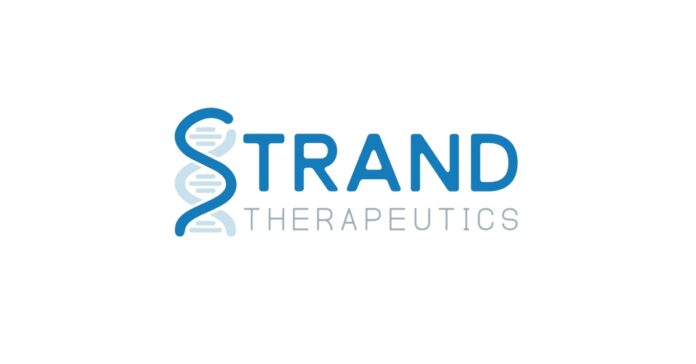CAMBRIDGE, Mass.– Strand Therapeutics, a privately held developer of next-generation, programmable mRNA therapeutics for cancer immunotherapy and other diseases, today announced that the company raised $52 million in an oversubscribed Series A financing round syndicated by Redmile Group, BeiGene, Ltd., and Camford Capital, as well as existing investors Playground Global and ANRI. Strand has raised a total of $66 million to date.
Founded by leaders in mRNA-based synthetic biology, Strand is creating the first platform for programmable, long-acting mRNA therapeutics that are bioengineered to enable precise control of the location, timing, intensity, and duration of their therapeutic activities. With the company’s self-replicating mRNAs, Strand’s goal is to develop improved treatment options for cancer and other life-threatening diseases.
“As shown with the COVID-19 vaccines, mRNA technology has revolutionized the way we can address diseases. At Strand, we have developed the next generation mRNA drug platform that can transform cancer treatment, cell therapy, and beyond,” said Jake Becraft, PhD, co-founder and CEO of Strand. “We’re excited to work with this world-class syndicate of investors to continue our development of novel mRNA therapies and bringing patients more efficacious, accessible, and cost-effective treatments.”
The company’s mRNA therapies combine genes for self-replication with genetically programmed logic circuits. By sensing and classifying unique expression signatures of cell types, the breakthrough technology enables precise and controlled delivery of multiple disease treatments in a single mRNA drug.
“While mRNA technologies allow drug development pipelines to move faster, existing platforms are limited due to lack of lasting therapeutic expression and control,” said Jory Bell, General Partner at Playground Global and a member of Strand’s Board of Directors. “With the groundbreaking technology of programmable mRNA therapeutics, Strand is set to bring potentially better treatment options to patients that are more effective and less toxic than current standards. We look forward to continuing our work with the incredible team at Strand.”
Strand’s initial focus is to develop its self-replicating programmable mRNA therapeutics to treat cancer, with plans to begin clinical trials of its first candidate in 2022. The company is also collaborating with the global biotechnology company BeiGene under a licensing agreement aimed at developing and commercializing Strand’s multi-functional mRNA technology to develop solid tumor immuno-oncology therapeutics.
“With this newest financing, we are well equipped to enable systemic delivery of mRNA to tumor cells and immune cells to tackle solid tumors as well as hematological malignancies,” said Tasuku Kitada, PhD, co-founder, President, and Head of R&D at Strand. “The next generation of mRNA therapeutics will require new technology to move beyond vaccines and into cancer and other diseases. Our rapid growth will now accelerate both deeper into cancer immunotherapies, as well as beyond into further areas of high unmet medical need.” (IANS)


